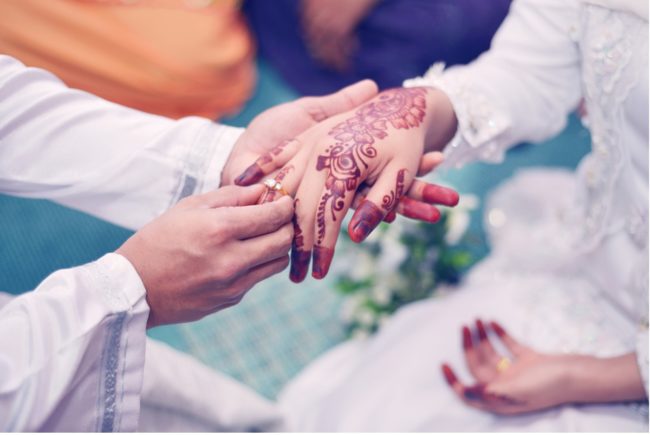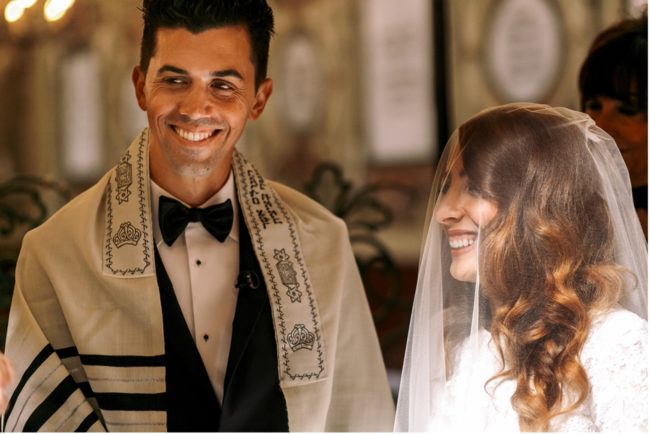Planning an interfaith wedding? You’re far from alone! In fact, according to the Pew Research Center, four in ten Americans (39 percent) marry a spouse in a different religious group. But while interfaith relationships are extremely common, there’s still a surprising lack of support out there for navigating these intermingling waters.
Luckily, we’re here to help you figure out how to plan an interfaith wedding that honors everybody’s beliefs, his and her wedding rings to the officiant. Here are a few things to keep in mind when getting hitched to someone of another religious tradition.
- Weddings Are Religious Traditions – One important thing to remember up front: even if you’ve got a spouse who otherwise does not actively practice religion, they may want to incorporate elements of their faith into the wedding. Try to respect their wishes and their need to honor their culture, regardless of whether or not it seems important to you. In some countries, weddings are more religious than cultural and vice versa, so keep this in mind when planning.
- Weddings, Like Marriage, Are About Compromise – Neither your future spouse’s nor your religious beliefs are more important than the other’s. Naturally, you’ll need to make some compromises when planning a ceremony that honors both. Try to prioritize the elements that are the most important to you and ask your partner to do the same. You should also try to determine what’s not so important to you so you might de-prioritize those things and focus on the more significant traditions.
- Both Parties Should Learn One Another’s Customs – Learning your spouse’s religious customs is important not only for the wedding, but for a long, happy life. For now, though, it’s crucial that you at least understand your partner religion’s wedding customs. Turn to YouTube, wedding blogs, forums and your partner’s family for insight into how traditional weddings work in their culture. Some questions to consider include:
- Which hand does the wedding ring go on? Remember, different cultures and religions approach this question differently, so make sure you know the tradition before you stand up at the altar!
- Who is the traditional officiant? Is it a priest, minister, rabbi or Maulvi? Is it OK to have a non-religious figure — such as a friend or a judge — marry you?
- Are there specific attire requirements for the bride, groom or bridal party? Do you have to consider any special cultural garb when planning your style?
- What do the specific ceremony traditions represent? Make sure you know what’s going on during the ceremony if you’re new to the religion.
- Are there guidelines for where you have to get married? Do you have to get married in a temple or chapel or can you get married wherever you want? Under your partner’s religion, are you allowed to get married outdoors?
 Source: zamzawawi isa/Shutterstock.com
Source: zamzawawi isa/Shutterstock.com
- Understand Your Commitment – In many religions, it’s customary for the out-of-faith member of the union to have to convert to the faith before getting married. This is called “marital conversion,” and it’s extremely controversial. In other religions, it’s common for the non-religious spouse-to-be to have to take religious or cultural classes before entering the union.
Understand your commitment when converting and talk with your future spouse about the process. If you’re doing it for cultural and traditional regions and don’t intend on being a true member of the faith, that’s fine. Just make sure your partner knows your true intentions.
- Be True to Yourself – Are there elements of religion in the vows? Will these elements go against your personal beliefs? Is an expensive ring required or can you opt for affordable wedding rings? Can you wear what you want to wear or do you have to compromise your vision for your partner’s faith? At the end of the day, you want to make sure you’re being true to yourself throughout the process. Make sure your vows are genuine promises that you believe and intend to keep and don’t compromise if you feel that your faith and vision aren’t being considered.
- Yes, You Can (and Should) Mix Faiths – The most important thing for interfaith couples to do is to find ways to mix their faiths in a way that makes sense and honors each person and their families. There are so many unique ways you can do this, from having two religious leaders officiate the wedding to incorporating compromises that are somewhere between both faiths. Here are some great ways to mix your religious beliefs in your interfaith wedding:
- Consider a secondary officiant so you have a representative from both of your faiths at the altar officiating your marriage. Be sure they meet one another ahead of time and have a plan for how to handle the ceremony.
- Find common ground. For example, if both faiths call for a specific attire, forgo them altogether and opt for a non-religious way of dressing.
- Have a representative from each faith say a prayer before dinner.
- Choose secular vows but incorporate religious elements in other ways, such as through prayer, readings and customs.
- Interfaith Weddings May Take More Time –Last, but not least, remember that your wedding is unique and there may be more to iron out than the obvious venue, food, drink and dress. For this reason, it helps to give your engagement a bit more time than you might otherwise. Spend an extra year or several months understanding your partner’s faith and finding special ways to incorporate both traditions into your big day. Talk to your partner’s family, friends and fellow members of their faith throughout this time to better understand the traditions.
 Source: IVASHstudio/Shutterstock.com
Source: IVASHstudio/Shutterstock.com
One last note: Remember that, at the end of the day, your wedding should be about you and your spouse. There’s no denying that navigating deep religious and cultural traditions is extremely complex, and you need to be respectful and honor them where necessary. At the same time, this union should feel true to you and your beliefs as a couple. Try to find ways to honor your spouse’s and your religious faiths equally and find common ground so you both feel that the ceremony is true to you and celebrates your love for one another.

